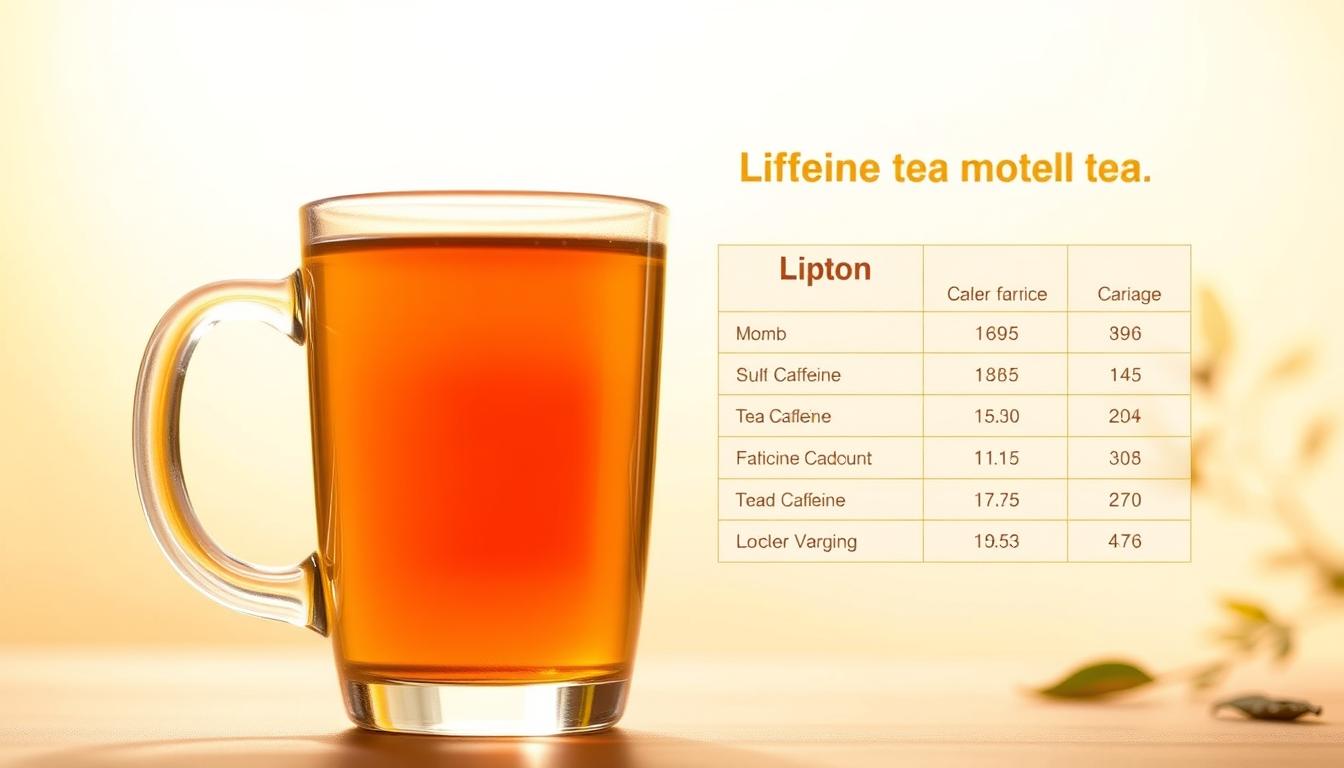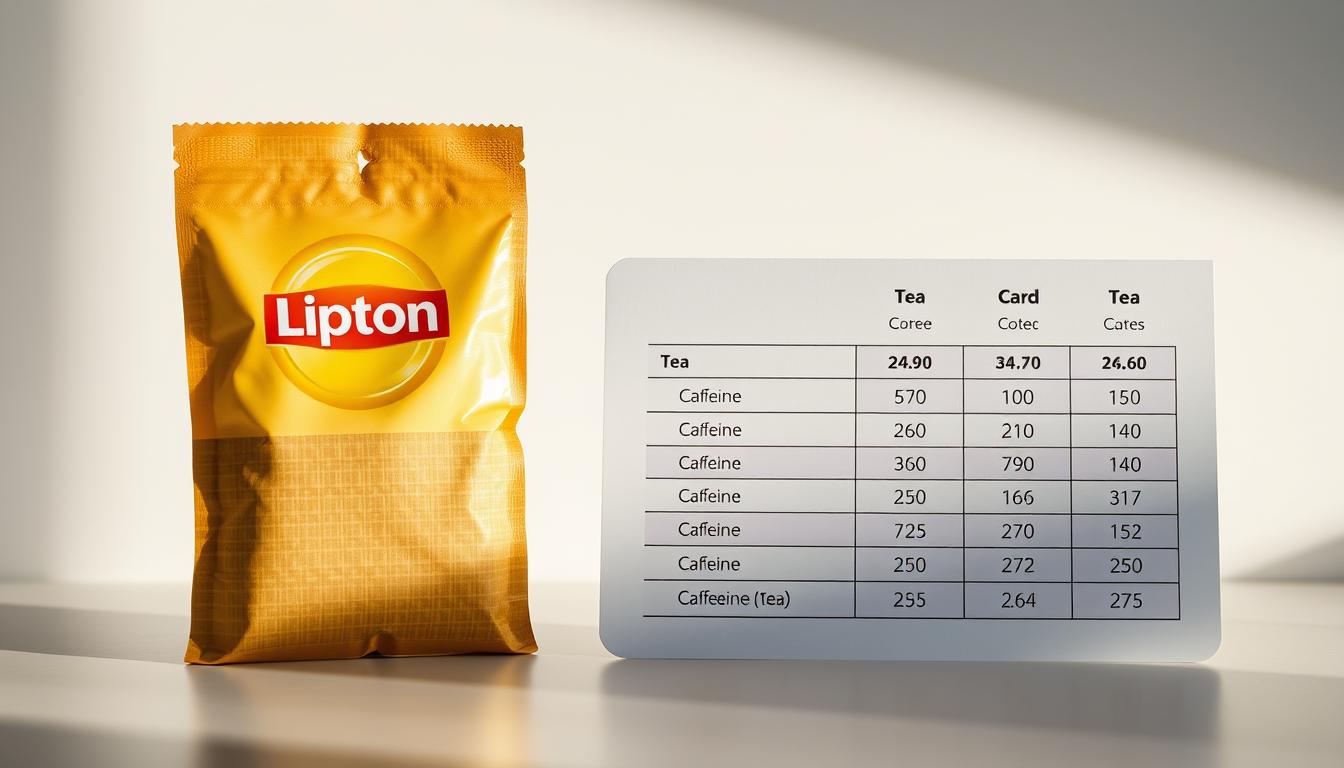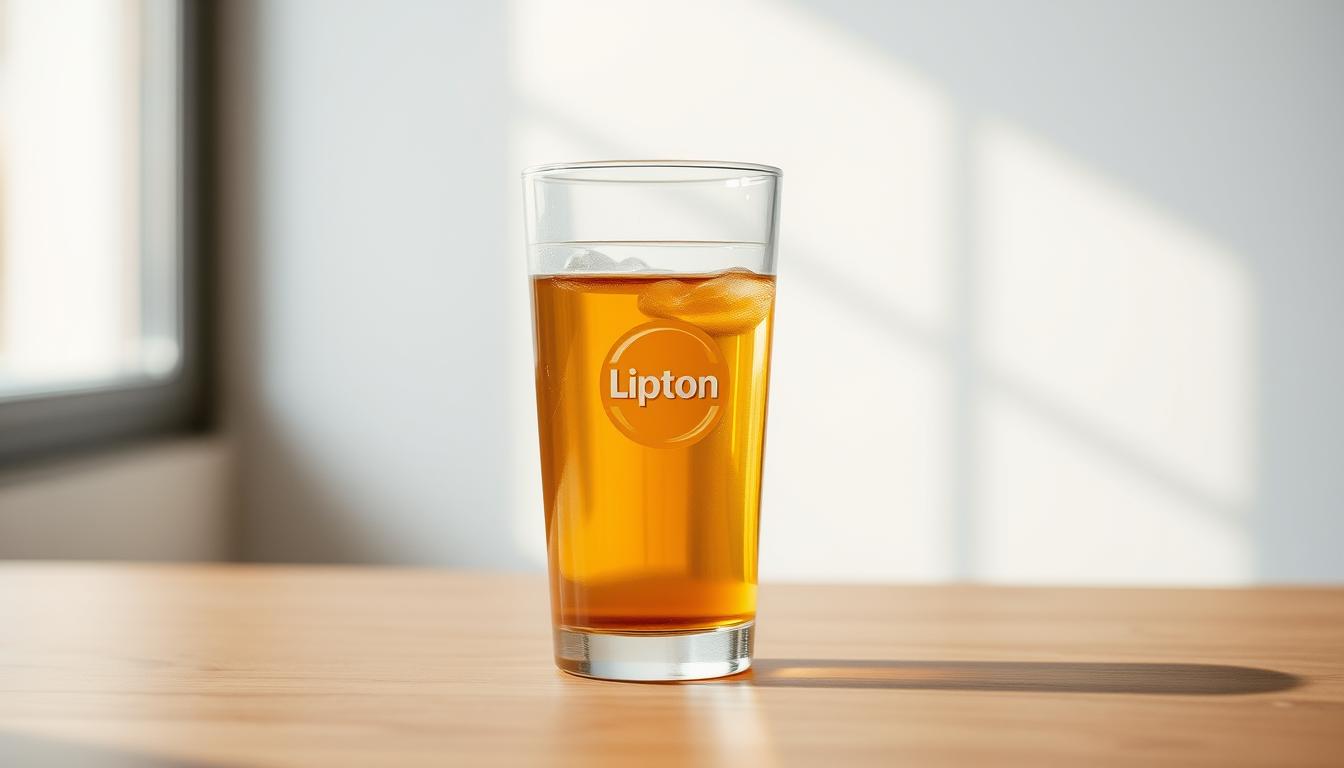Did you know that a single cup of Lipton Black Tea contains about 55 mg of caffeine? For many, this beloved beverage is a daily ritual, but understanding its caffeine content is essential for those mindful of their intake.
Lipton offers a variety of options, from robust black tea to soothing green tea and decaffeinated blends. Each type has a unique caffeine level, influenced by factors like brew time and cup size. For example, a decaf version typically contains only 4-5 mg per serving.
Whether you’re savoring a hot cup or enjoying iced tea, knowing the caffeine amount can help you make informed choices. This guide dives into the details, backed by research, to answer your questions and provide clarity.
Key Takeaways
- Lipton Black Tea contains about 55 mg of caffeine per 8 fl. oz.
- Decaffeinated options have only 4-5 mg per serving.
- Brew time and cup size affect caffeine extraction.
- Different varieties, like green and black tea, have varying caffeine levels.
- Understanding caffeine content helps manage daily intake.
Understanding Lipton Tea’s Caffeine Content
The caffeine content in Lipton teas depends on the type and brewing method. Each variety offers a unique experience, from bold black blends to lighter green options. Knowing these differences helps you pick the right tea for your needs.

Caffeine Levels in Different Lipton Tea Varieties
Lipton Black Tea is known for its robust flavor and higher caffeine content. Brewed for three minutes, it delivers about 55 mg per 8 fl. oz. This makes it a great choice for those seeking a morning boost.
Green tea varieties, on the other hand, have slightly lower caffeine levels. Flavored green teas typically range from 15 to 30 mg per cup. These options are perfect for a milder pick-me-up.
For those avoiding caffeine, decaffeinated blends contain only 4-5 mg per serving. This ensures you can enjoy your tea without worrying about overstimulation.
The Impact of Brew Time on Caffeine Extraction
Brew time plays a significant role in determining the final caffeine amount. Steeping a tea bag for 2-5 minutes can influence how much caffeine is extracted. Longer brew times generally result in higher concentrations.
For example, a three-minute steep for black tea yields 55 mg of caffeine, while a five-minute steep might increase this slightly. Adjusting brew time allows you to customize your tea experience.
Here’s a quick breakdown of how brew time affects caffeine levels:
- 2 minutes: Lower caffeine extraction, ideal for lighter teas.
- 3 minutes: Balanced caffeine level, perfect for most varieties.
- 5 minutes: Higher caffeine concentration, suited for strong blends.
Understanding these factors helps you tailor your tea to match your caffeine preferences.
does lipton tea have caffeine: What the Research Shows
Research reveals interesting differences in caffeine levels between hot and iced Lipton teas. Whether you prefer a steaming cup or a refreshing glass, the way you prepare your beverage can significantly impact its caffeine content. Let’s dive into the findings to help you make informed choices.
Comparing Caffeine in Hot and Iced Tea Options
Hot brewed Lipton Black Tea typically contains about 55 mg of caffeine per 8-ounce serving. This is due to the longer brew time and higher water temperature, which extract more caffeine from the tea bag.
On the other hand, Lipton Original Unsweetened Iced Tea has a lower caffeine amount, averaging 24 mg per serving. The shorter brewing process and cooler water temperature result in less caffeine extraction.

Here’s a quick comparison of caffeine levels in hot and iced Lipton teas:
| Type | Serving Size | Caffeine Amount |
|---|---|---|
| Hot Brewed Black Tea | 8 ounces | 55 mg |
| Iced Tea | 8 ounces | 24 mg |
Factors like brew time, water temperature, and serving size all play a role in determining the final caffeine content. For example, steeping a tea bag for five minutes instead of three can slightly increase the caffeine level in hot tea.
Understanding these differences allows you to choose the right option for your needs. Whether you’re looking for a morning boost or a lighter drink, Lipton offers a variety to suit your preferences.
Exploring Lipton Tea Varieties and Their Impact on Caffeine Levels
Lipton offers a range of tea varieties, each with distinct caffeine levels. Whether you prefer a bold black blend or a lighter green option, understanding these differences helps you make the right choice for your needs.
Black Tea vs. Green Tea: A Detailed Comparison
Black tea is known for its robust flavor and higher caffeine content. A standard 8-ounce cup contains about 55 mg. This makes it a popular choice for those seeking a morning energy boost.
Green tea, on the other hand, has a milder taste and lower caffeine levels. Depending on the flavor, it ranges from 20 to 45 mg per cup. This makes it ideal for a gentler pick-me-up throughout the day.
Brewing methods also play a role. Steeping a tea bag for 3-5 minutes in hot water extracts more caffeine. Adjusting the brew time allows you to control the strength of your drink.
Decaf Selections and Their Minimal Caffeine Content
For those looking to limit their intake, decaffeinated options are a great alternative. These blends typically contain only 4-5 mg per serving. This ensures you can enjoy your tea without worrying about overstimulation.
Decaf teas are processed to remove most of the caffeine, making them suitable for evening relaxation or for those sensitive to stimulants. The flavor remains rich, offering a satisfying experience without the buzz.
When choosing between varieties, consider your caffeine needs. Black tea provides a stronger boost, while green tea offers a milder option. Decaf selections are perfect for those who want to avoid caffeine altogether.
Conclusion
Understanding the caffeine profile of your favorite brew can make a big difference in your daily routine. Black tea typically contains about 55 mg per cup, while green tea offers a milder range of 20-45 mg. For those looking to reduce their intake, decaf options provide as little as 4-5 mg per serving.
Brew time and water temperature also play a key role in determining the final caffeine amount. A longer steep or hotter water extracts more, so adjusting these factors lets you control your experience.
Whether you prefer a bold black blend or a lighter green option, knowing these details helps you enjoy your tea ritual with confidence. Sip smart and savor every cup!

